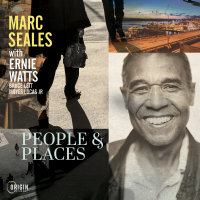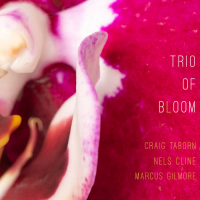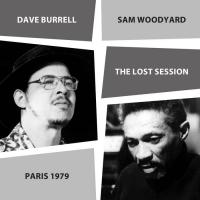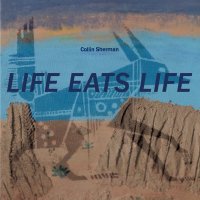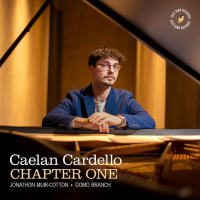Home » Jazz Articles » Bailey's Bundles » Notable and Nearly Missed 2014
Notable and Nearly Missed 2014
Demanding much of talent and technique, jazz provides new releases that tend to be, at least, "pretty good" (not unlike sex, pizza and beer). The "wisdom" alluded to in Reinhold Niebuhr's serenity prayer (..."and the wisdom to know the one from the other.") is that discerning taste able to separate the merely "good" from the quite "exceptional." What follows are some of the recordings I heard this year but did not or could not write about. The majority of these will not have otherwise been covered at All About Jazz.
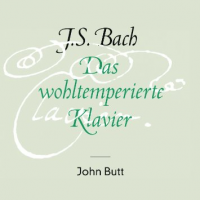 John Butt—J.S. Bach: Das wohltemperierte Klavier (Linn Records, 2014). John Butt and his Dunedin Consort has already lit a blazing bonfire in period instrument/performance circles. Butt's Mozart Requiem (Linn, 2014) was revelatory and his reading of Handel's Messiah (Linn, 2013) was transcendent. Butt has previously established his Bach bona fides with meticulously researched recordings of the Brandenburg Concertos, John Passion and the Mass in B Minor. It is no surprise then that Butt elected to display his keyboard chops on Bach's Well-Tempered Clarier. As expected, Butt performs on harpsichord, specifically a copy of German instrument (dated 1702-04) by Michael Mietke tuned to a' = 415Hz (the Modern a note resonates at 440Hz). Butt's playing is reverent, precise and accurate. He obviously treasures his Bach in the original vernacular, crisp and punctuated.
John Butt—J.S. Bach: Das wohltemperierte Klavier (Linn Records, 2014). John Butt and his Dunedin Consort has already lit a blazing bonfire in period instrument/performance circles. Butt's Mozart Requiem (Linn, 2014) was revelatory and his reading of Handel's Messiah (Linn, 2013) was transcendent. Butt has previously established his Bach bona fides with meticulously researched recordings of the Brandenburg Concertos, John Passion and the Mass in B Minor. It is no surprise then that Butt elected to display his keyboard chops on Bach's Well-Tempered Clarier. As expected, Butt performs on harpsichord, specifically a copy of German instrument (dated 1702-04) by Michael Mietke tuned to a' = 415Hz (the Modern a note resonates at 440Hz). Butt's playing is reverent, precise and accurate. He obviously treasures his Bach in the original vernacular, crisp and punctuated. 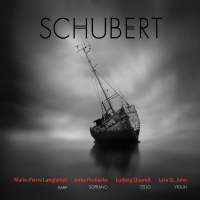 Lara St. John—Schubert (Ancalagon, 2014). Violinist Lara St. John has become a special brand of raconteur in the classical music business. Her early Bach recordings are quite exceptional, but St. John has cleared a path with some well-conceived projects like her recent Bach Sonatas with harpist Marie-Pierre Langlamet and coupling of Vivaldi and Piazzolla over The Four Seasons. Entitled simply Schubert, St. John programs a recital of Schubert pieces from early and late in the young composer's life, using the unique format of violin, cello (Ludwig Quandt), harp (Langlamet)and soprano voice (Anna Prohaska). The vocal selections are songs based on Goethe. St. John's daring pays off in a highly listenable recording that has much to teach us about performance and interpretation.
Lara St. John—Schubert (Ancalagon, 2014). Violinist Lara St. John has become a special brand of raconteur in the classical music business. Her early Bach recordings are quite exceptional, but St. John has cleared a path with some well-conceived projects like her recent Bach Sonatas with harpist Marie-Pierre Langlamet and coupling of Vivaldi and Piazzolla over The Four Seasons. Entitled simply Schubert, St. John programs a recital of Schubert pieces from early and late in the young composer's life, using the unique format of violin, cello (Ludwig Quandt), harp (Langlamet)and soprano voice (Anna Prohaska). The vocal selections are songs based on Goethe. St. John's daring pays off in a highly listenable recording that has much to teach us about performance and interpretation. 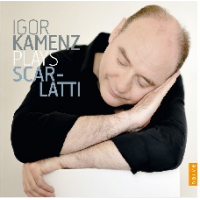 Igor Kamenz—Plays Scarlatti (Naive, 2014). Russian pianist Igor Kamenz recorded repertoire has up until now included Beethoven sonatas. His performance repertoire includes Beethoven, Schumann, Couperin, Liszt...and a healthy smattering of Domenico Scarlatti. Scarlatti, Couperin and all of these romantics make for strange stylistic bedfellows. But Vladimir Horowitz made it work in his own inimitable style. Kamenz reprises many of the same sonata Horowitz addresses, doing so in a much more period punctual manner. Kamenz goes light on the Romanticism in deference to a more Classical approach. That said, Kamenz plays the minor key sonatas richly and well-paced. The A minor Sonata, K109 is almost Chopinesque, creamy with reverie. He attacks the up-tempo and driving D minor sonata, K141 with near fury. Kamenz concentration and articulation are impressive and expressive.
Igor Kamenz—Plays Scarlatti (Naive, 2014). Russian pianist Igor Kamenz recorded repertoire has up until now included Beethoven sonatas. His performance repertoire includes Beethoven, Schumann, Couperin, Liszt...and a healthy smattering of Domenico Scarlatti. Scarlatti, Couperin and all of these romantics make for strange stylistic bedfellows. But Vladimir Horowitz made it work in his own inimitable style. Kamenz reprises many of the same sonata Horowitz addresses, doing so in a much more period punctual manner. Kamenz goes light on the Romanticism in deference to a more Classical approach. That said, Kamenz plays the minor key sonatas richly and well-paced. The A minor Sonata, K109 is almost Chopinesque, creamy with reverie. He attacks the up-tempo and driving D minor sonata, K141 with near fury. Kamenz concentration and articulation are impressive and expressive. 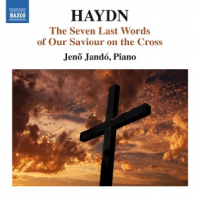 Jeno Jando—Haydn: The Last Seven Words of Our Saviour on the Cross (Naxos, 2014). Jeno Jando could properly be considered the house pianist for Naxos. He has recorded for the label since its inception producing the complete sonatas of Haydn, Mozart and Beethoven, as well as Schubert and Schumann. He is omnivorous in his repertoire equally at home with Bach or Bartok. Jando augments his Haydn repertoire with the piano reduction of "The Seven Last Words." Papa Haydn prepared three scores of his piece: one for orchestra, one for string quartet and one for solo piano. Jando's performance is welcome as there are few piano recordings of the piece. As would be expected, Jando infuses the piece with all of his experience, with early sections sounding startling Baroque, while the later sections evolve into the avant-garde. It is a harrowing account of a staid piece of music.
Jeno Jando—Haydn: The Last Seven Words of Our Saviour on the Cross (Naxos, 2014). Jeno Jando could properly be considered the house pianist for Naxos. He has recorded for the label since its inception producing the complete sonatas of Haydn, Mozart and Beethoven, as well as Schubert and Schumann. He is omnivorous in his repertoire equally at home with Bach or Bartok. Jando augments his Haydn repertoire with the piano reduction of "The Seven Last Words." Papa Haydn prepared three scores of his piece: one for orchestra, one for string quartet and one for solo piano. Jando's performance is welcome as there are few piano recordings of the piece. As would be expected, Jando infuses the piece with all of his experience, with early sections sounding startling Baroque, while the later sections evolve into the avant-garde. It is a harrowing account of a staid piece of music. 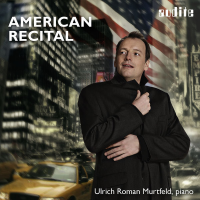 Ulrich Roman Murtfeld—American Recital (Audite, 2014). German pianist Ulrich Roman Murtfeld takes a big bite out of 100 years of North American piano composition on his American Recital. Murtfeld brings together five disparate American composers in Gottschalk, Gershwin, Glass, Rzewski and Barber, thereby assembling one of the better piano collections recently conceived. Murtfeld's Gottschalk is solid with the exception of "The Banjo" which is played at too fast a tempo (but played well nevertheless). His Gershwin is equally solid, rhythmic and relaxed in turn. Philip Glass' "Opening Piece" from Glassworks is sumptuous and deep, resonating from liberal pedal use. Rzewski's Piano Piece No. 4 is about as far out as the recital gets while Barber's "Nocturne," Op. 33 is dark and rich. Barber's piano sonata is performed similarly. Murtfeld's confident hand and command of his American repertoire make of a most entertaining listen.
Ulrich Roman Murtfeld—American Recital (Audite, 2014). German pianist Ulrich Roman Murtfeld takes a big bite out of 100 years of North American piano composition on his American Recital. Murtfeld brings together five disparate American composers in Gottschalk, Gershwin, Glass, Rzewski and Barber, thereby assembling one of the better piano collections recently conceived. Murtfeld's Gottschalk is solid with the exception of "The Banjo" which is played at too fast a tempo (but played well nevertheless). His Gershwin is equally solid, rhythmic and relaxed in turn. Philip Glass' "Opening Piece" from Glassworks is sumptuous and deep, resonating from liberal pedal use. Rzewski's Piano Piece No. 4 is about as far out as the recital gets while Barber's "Nocturne," Op. 33 is dark and rich. Barber's piano sonata is performed similarly. Murtfeld's confident hand and command of his American repertoire make of a most entertaining listen. 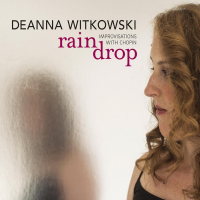

Deanna Witkowski
pianob.1972
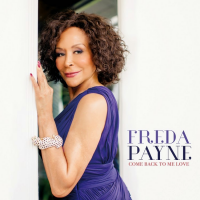

Freda Payne
vocals
Bill Cunliffe
pianob.1956
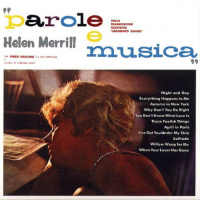

Helen Merrill
vocalsb.1929

June Christy
vocals1925 - 1990

Rosemary Clooney
vocals1928 - 2002

Anita O'Day
vocals1919 - 2006

Julie London
vocals1926 - 2000

Earl Hines
piano1903 - 1983
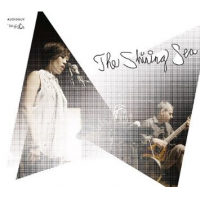 Sunny Kim &
Sunny Kim & 
Ben Monder
guitarb.1962

Roswell Rudd
trombone1935 - 2017
 Amy McCarley—Jet Engines (Self Produced, 2014). There is more to Alabama music today than Jason Isbell. Amy McCarley may be Isbell's creative counterpart. Her songs rely on the hard scrabble of rural life, spread over the post-bellum southern landscape. She is capable of that modern alt-country sound like "Everybody Wants to" and "Radio On" and equally adept at the throwback country as on "Here I am." McCarley's voice is a strange mixture of Bob Dylan's phrasing and a stable Lucinda Williams tone. Her songwriting reveals a well-studied musician who manifests her influences strictly through her own creative filter. She is surrounded by good players: Kenny Vaughan's electric guitar twangs true on "Fools Lament" and George Bradfute's slide guitar adds bona fides to "Head out of Town." The title tune encompasses all of McCarley's charms: erudition and intelligence sung with southern grit.
Amy McCarley—Jet Engines (Self Produced, 2014). There is more to Alabama music today than Jason Isbell. Amy McCarley may be Isbell's creative counterpart. Her songs rely on the hard scrabble of rural life, spread over the post-bellum southern landscape. She is capable of that modern alt-country sound like "Everybody Wants to" and "Radio On" and equally adept at the throwback country as on "Here I am." McCarley's voice is a strange mixture of Bob Dylan's phrasing and a stable Lucinda Williams tone. Her songwriting reveals a well-studied musician who manifests her influences strictly through her own creative filter. She is surrounded by good players: Kenny Vaughan's electric guitar twangs true on "Fools Lament" and George Bradfute's slide guitar adds bona fides to "Head out of Town." The title tune encompasses all of McCarley's charms: erudition and intelligence sung with southern grit. 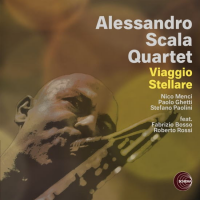 Alessandro Scala Quartet—Viaggio Stellare (Schema, 2014). Italy has long been a bastion of jazz. The shiny new Italian label Schema is highlighting all at once directions in jazz. Currently considered is saxophonist Alessandro Scala's Viaggio Stellare, a supplemented quartet recital of mostly original compositions that plant themselves in the middle of hard bop mainstream circa Dexter Gordon in the 1960s. But the music sounds more updated than that. While Scala is obviously a fan of Gordon's (penning the excellent "Dexter's Blues") he sports a denser, more compact tenor tone. The same might be said for his soprano playing, and in any case Scala mostly avoids the Coltrane black hole, succumbing to circular figures played at light speed only occasionally and never to the expense of the music. Sonically, Viaggio Stellare is stunning...crisp and driving.
Alessandro Scala Quartet—Viaggio Stellare (Schema, 2014). Italy has long been a bastion of jazz. The shiny new Italian label Schema is highlighting all at once directions in jazz. Currently considered is saxophonist Alessandro Scala's Viaggio Stellare, a supplemented quartet recital of mostly original compositions that plant themselves in the middle of hard bop mainstream circa Dexter Gordon in the 1960s. But the music sounds more updated than that. While Scala is obviously a fan of Gordon's (penning the excellent "Dexter's Blues") he sports a denser, more compact tenor tone. The same might be said for his soprano playing, and in any case Scala mostly avoids the Coltrane black hole, succumbing to circular figures played at light speed only occasionally and never to the expense of the music. Sonically, Viaggio Stellare is stunning...crisp and driving. 

Manuel Valera
pianob.1980

Yosvany Terry
saxophone
Alex Sipiagin
trumpetb.1967
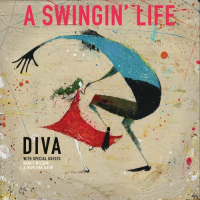

The DIVA Jazz Orchestra
band / ensemble / orchestrab.1992

Sherrie Maricle
drumsb.1963

Sharel Cassity
saxophone
Anat Cohen
clarinetb.1975
Janelle Reichman
woodwinds
Carol Morgan
trumpetb.1968

Nancy Wilson
vocals1937 - 2018

Marlena Shaw
vocals1942 - 2024
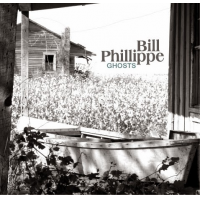 Bill Phillippe—Ghosts (Self Produced, 2014). For those listeners weaned on acoustic slingers like John Fahey, Leo Kottke, Jorma Kaukonen, Bill Phillippe's guitar style might be heard as too simplistic, lacking the technical bells and whistles that plagued most of the (white) acoustic blues performance in the 1960s and '70s. Phillippe is in no way a flashy guitarist or vocalist. What he is is honest and this honesty and genuineness is what makes Ghosts a treat. Phillippe plays Robert Johnson's "Come on in My Kitchen" in a standard tuning with finger picking as opposed to playing with a slide as many others (David Bromberg, Duane Allman) have done. Phillippe's "Keep Your Lamps Trimmed and Burning" sounds light years from Hot Tuna's. His spare playing and singing give the piece a stark and cold personality. "Motherless Children," "In My Time of Dying," "Death Letter," and "God Don't Never Change" all ring with renewed authenticity and grace.
Bill Phillippe—Ghosts (Self Produced, 2014). For those listeners weaned on acoustic slingers like John Fahey, Leo Kottke, Jorma Kaukonen, Bill Phillippe's guitar style might be heard as too simplistic, lacking the technical bells and whistles that plagued most of the (white) acoustic blues performance in the 1960s and '70s. Phillippe is in no way a flashy guitarist or vocalist. What he is is honest and this honesty and genuineness is what makes Ghosts a treat. Phillippe plays Robert Johnson's "Come on in My Kitchen" in a standard tuning with finger picking as opposed to playing with a slide as many others (David Bromberg, Duane Allman) have done. Phillippe's "Keep Your Lamps Trimmed and Burning" sounds light years from Hot Tuna's. His spare playing and singing give the piece a stark and cold personality. "Motherless Children," "In My Time of Dying," "Death Letter," and "God Don't Never Change" all ring with renewed authenticity and grace. 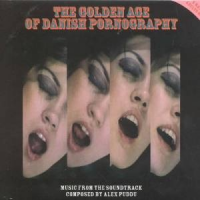 Alex Puddu—The Golden Age of Danish Pornography (Schema, 2014). Multi-instrumentalist Alex Puddu took on the near irresistible challenge to score several soundless loops of Danish pornography from the 1970s that were produced by Freddy Weiss. That alone is reason enough to be curious about the recording. Secondly, pornography soundtrack in the golden age of the art form was clichЁҰ before it was even programmed. Puddu directs an augmented quintet in fourteen tautly composed and performed pieces of music that are just artful enough to be taken seriously while still retaining a whiff of sleaze and decadence. "Massage Salonen" is straight-ahead blues hard bop performed perfectly on instrumentation that provides a faux-update on the original musical intention. These pieces are harmonically simple and composed to recycle themselves. The soloing is effective and sonically superb. Puddu captures the early '70s in all their depraved glory.
Alex Puddu—The Golden Age of Danish Pornography (Schema, 2014). Multi-instrumentalist Alex Puddu took on the near irresistible challenge to score several soundless loops of Danish pornography from the 1970s that were produced by Freddy Weiss. That alone is reason enough to be curious about the recording. Secondly, pornography soundtrack in the golden age of the art form was clichЁҰ before it was even programmed. Puddu directs an augmented quintet in fourteen tautly composed and performed pieces of music that are just artful enough to be taken seriously while still retaining a whiff of sleaze and decadence. "Massage Salonen" is straight-ahead blues hard bop performed perfectly on instrumentation that provides a faux-update on the original musical intention. These pieces are harmonically simple and composed to recycle themselves. The soloing is effective and sonically superb. Puddu captures the early '70s in all their depraved glory. 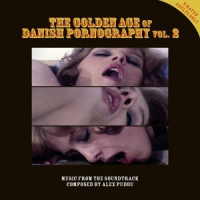 Alex Puddu—The Golden Age of Danish Pornography vol.2 (Schema, 2014). One volume of music contemporarily composed for early '70s Danish pornography was simply not enough. Alex Puddu followed the first volume with a second even more finely produced. And how can one resist pieces entitled, "Boys and Girls and Danish Hotdogs" or "Horny at the Office." Puddu establishes a texture that finds its way into all ten of the pieces on the recording. Based on two or three chords and played appropriately in a looping fashion, this music becomes some retro-dance disguised as ambient music. Puddu's conservative use of the sitar gives the pieces a James-Bond feel. There is an immediate nostalgia to these pieces, that when heard separated from its object, recall white bell-bottom pants and pillow sleeve shirts, clove cigarettes and cocaine.
Alex Puddu—The Golden Age of Danish Pornography vol.2 (Schema, 2014). One volume of music contemporarily composed for early '70s Danish pornography was simply not enough. Alex Puddu followed the first volume with a second even more finely produced. And how can one resist pieces entitled, "Boys and Girls and Danish Hotdogs" or "Horny at the Office." Puddu establishes a texture that finds its way into all ten of the pieces on the recording. Based on two or three chords and played appropriately in a looping fashion, this music becomes some retro-dance disguised as ambient music. Puddu's conservative use of the sitar gives the pieces a James-Bond feel. There is an immediate nostalgia to these pieces, that when heard separated from its object, recall white bell-bottom pants and pillow sleeve shirts, clove cigarettes and cocaine.
Tags
Freda Payne
Bailey's Bundles
C. Michael Bailey
Deanna Witkowski
Bill Cunliffe
Helen Merrill
June Christy
Rosemary Clooney
Chris Conner
Anita O'Day
Julie London
Earl Hines
Ben Monder
Roswell Rudd
Manuel Valera
Yosvany Terry
Alex Sipiagin
Diva
Sherrie Maricle
Sharel Cassity
Anat Cohen
Janelle Reichman
Carol Morgan
Nancy Wilson
Marlena Shaw
Comments
PREVIOUS / NEXT
Freda Payne Concerts
Sep
27
Sat

Freda Payne
Catalina Jazz ClubHollywood, CA
Support All About Jazz
 All About Jazz has been a pillar of jazz since 1995, championing it as an art form and, more importantly, supporting the musicians who make it. Our enduring commitment has made "AAJ" one of the most culturally important websites of its kind, read by hundreds of thousands of fans, musicians and industry figures every month.
All About Jazz has been a pillar of jazz since 1995, championing it as an art form and, more importantly, supporting the musicians who make it. Our enduring commitment has made "AAJ" one of the most culturally important websites of its kind, read by hundreds of thousands of fans, musicians and industry figures every month.







 Buy Now
Buy Now



